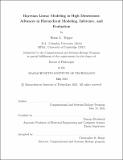Bayesian Linear Modeling in High Dimensions: Advances in Hierarchical Modeling, Inference, and Evaluation
Author(s)
Trippe, Brian L.
DownloadThesis PDF (8.644Mb)
Advisor
Broderick, Tamara
Terms of use
Metadata
Show full item recordAbstract
Across the sciences, social sciences and engineering, applied statisticians seek to build understandings of complex relationships from increasingly large datasets. In statistical genetics, for example, we observe up to millions of genetic variations in each of thousands of individuals, and wish to associate these variations with the development of disease. For ‘high dimensional’ problems like this, the languages of linear modeling and Bayesian statistics appeal because they provide interpretability, coherent uncertainty, and the capacity for information sharing across related datasets. But at the same time, high dimensionality introduces several challenges not solved by existing methodology.
This thesis addresses three challenges that arise when applying the Bayesian methodology in high dimensions. A first challenge is how to apply hierarchical modeling, a mainstay of Bayesian inference, to share information between multiple linear models with many covariates (for example, genetic studies of multiple related diseases). The first part of the thesis demonstrates that the default approach to hierarchical linear modeling fails in high dimensions, and presents a new, effective model for this regime. The second part of the thesis addresses the computational challenge presented by Bayesian inference in high dimensions — existing methods demand time that scales super-linearly with the number of covariates. We present two algorithms that permit fast, accurate inferences by leveraging (i) low rank approximations of data or (ii) parallelism across a certain class of Markov chain Monte Carlo algorithms. The final part of the thesis addresses the challenge of evaluation. Modern statistics provides an expansive toolkit for estimating unknown parameters, and a typical Bayesian analysis justifies its estimates through belief in subjective a priori assumptions. We address this by introducing a measure of confidence in the new estimate (the ‘c-value’), that can diagnose the accuracy of a Bayesian estimate without requiring this subjectivism.
Date issued
2022-05Department
Massachusetts Institute of Technology. Computational and Systems Biology ProgramPublisher
Massachusetts Institute of Technology